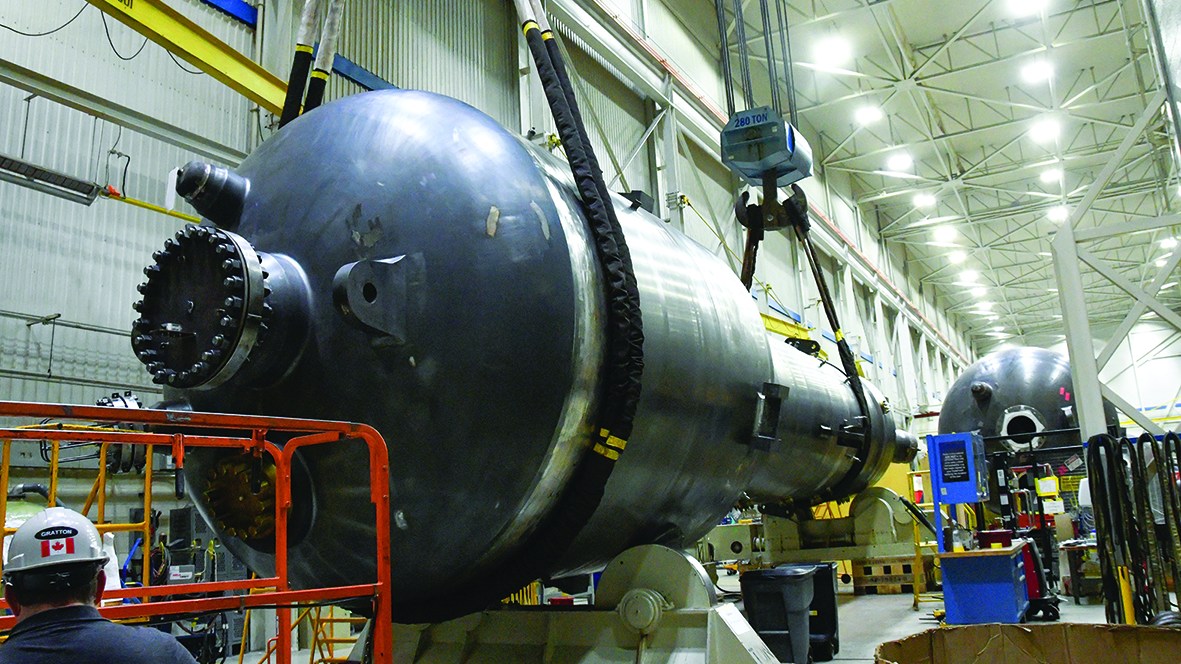Science
Anglesey Selected for UK’s First Mini Nuclear Power Stations

The Welsh island of Anglesey has been selected as the site for the United Kingdom’s first “mini” nuclear power stations. According to sources close to the matter, Wylfa has emerged as the preferred location over Oldbury in Gloucestershire for the development of small modular reactors (SMRs), which will be constructed by Rolls-Royce. The official announcement from the Department for Energy Security and Net Zero is expected on March 7, 2024.
The decision has garnered attention from political figures, including Sir Keir Starmer, who has expressed a commitment to overcoming local opposition to ensure the successful deployment of these innovative plants. Sir Tony Blair has also publicly supported the initiative, highlighting the potential benefits of smaller atomic energy generation.
Currently, no full-scale commercial SMRs have been deployed anywhere in the world. Nevertheless, Rolls-Royce anticipates that its first reactor will provide a consistent supply of low-carbon electricity by the mid-2030s. SMRs, as the name suggests, have a much lower capacity compared to traditional nuclear power plants. The Wylfa station is expected to produce around 0.47 gigawatts (GW) of power, a significant reduction compared to the 3.2 GW capacity of larger facilities such as those under construction at Hinkley in Somerset and Sizewell in Suffolk.
Implications for Energy Security
The choice of Anglesey represents a strategic move by the UK government to diversify its energy portfolio while promoting low-carbon solutions. As energy demands continue to rise, the integration of SMRs could play a crucial role in meeting future electricity needs. The government aims to enhance energy security and reduce reliance on fossil fuels through such advancements.
Local communities may have mixed reactions to the proposed developments. Proponents argue that the introduction of smaller nuclear power stations could bring economic benefits and job opportunities to the region. Critics, however, may voice concerns regarding safety and environmental impacts.
Future of Small Modular Reactors
With increasing emphasis on sustainable energy, SMRs have gained traction as a viable alternative to conventional nuclear power. Their smaller size allows for more flexible deployment options and reduced upfront costs, which can enhance project feasibility.
The UK is not the only country exploring the potential of SMRs. Nations worldwide are investigating the technology as a means to provide cleaner energy solutions. As developments progress, the success of the Wylfa project may influence similar initiatives globally.
In summary, the decision to site the UK’s first mini nuclear power stations at Wylfa in Anglesey marks a significant step toward innovation in energy production. With the potential for reliable, low-carbon electricity generation, this initiative could reshape the future landscape of nuclear energy in the UK and beyond.
-

 Health3 months ago
Health3 months agoNeurologist Warns Excessive Use of Supplements Can Harm Brain
-

 Health3 months ago
Health3 months agoFiona Phillips’ Husband Shares Heartfelt Update on Her Alzheimer’s Journey
-

 Science2 months ago
Science2 months agoBrian Cox Addresses Claims of Alien Probe in 3I/ATLAS Discovery
-

 Science2 months ago
Science2 months agoNASA Investigates Unusual Comet 3I/ATLAS; New Findings Emerge
-

 Science1 month ago
Science1 month agoScientists Examine 3I/ATLAS: Alien Artifact or Cosmic Oddity?
-

 Entertainment5 months ago
Entertainment5 months agoKerry Katona Discusses Future Baby Plans and Brian McFadden’s Wedding
-

 Science1 month ago
Science1 month agoNASA Investigates Speedy Object 3I/ATLAS, Sparking Speculation
-

 Entertainment4 months ago
Entertainment4 months agoEmmerdale Faces Tension as Dylan and April’s Lives Hang in the Balance
-

 World3 months ago
World3 months agoCole Palmer’s Cryptic Message to Kobbie Mainoo Following Loan Talks
-

 Science1 month ago
Science1 month agoNASA Scientists Explore Origins of 3I/ATLAS, a Fast-Moving Visitor
-

 Entertainment2 months ago
Entertainment2 months agoLewis Cope Addresses Accusations of Dance Training Advantage
-

 Entertainment3 months ago
Entertainment3 months agoMajor Cast Changes at Coronation Street: Exits and Returns in 2025









